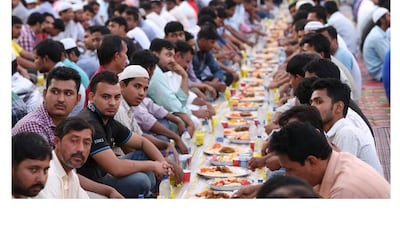MUSCAT // Every year, Ramadan brings relief to hundreds of illegal foreign workers living rough on the streets of the Omani capital.
Mosques give them meals and shelter, and authorities who would normally arrest them observe an unofficial amnesty.
But this year, Ramadan’s spirit of compassion has been extended further, with all of the mosques in Muscat opening their doors to non-Muslims as well.
Homeless workers have been welcomed for free meals every evening throughout the holy month, regardless of their creed, nationality or religion, said Sheikh Said Mahmood, imam of Al Seeb mosque in the Seeb area of Muscat.
“This is the first time we have opened the doors of the mosques to allow people from different religions for iftar,” Sheikh Said said.
“Normally only Muslims are allowed in but this Ramadan anyone hungry is welcomed.
“Ramadan is the best month for them. They temporarily end their hand-to-mouth existence and mingle freely with everyone without the fear of being arrested.
“The mosques during the holy month of Ramadan are like sanctuaries to them. Some even sleep in the courtyards and use the toilet facilities. They disappear after Ramadan.”
The men sit side by side on mats in the mosque courtyards, eating food from local restaurants and paid for by people of the neighbourhood.
One of the donors is civil servant Nabil Al Darwish, 56, who said he and his neighbours came up with the idea.
“In the difficult time in which we live, we must share whatever we have got with people who are less fortunate than us,” Mr Al Darwish said.
“Difficult circumstances have made them homeless and it is our duty to do something about it at least once a year.”
Most of these homeless men are labourers or domestic workers from Pakistan, Bangladesh, India, Sri Lanka and Africa, who have lost their jobs.
They stay on illegally in Oman, often unable to afford the air fare home, and sleep in parks and other public places.
Ramesh Chowdhary, an Indian Hindu, entered a mosque for the first time this Ramadan, sitting with Muslims to join in with the iftar.
He came with Rony Rodriguez, his friend and compatriot. Both men were brought along by their Muslim countrymen.
“I was nervous the first day of Ramadan to eat in a mosque because I know it is not allowed,” Mr Chowdary said. “But the imam assured us it was okay to be here and we can come the rest of the Ramadan month with no obligation.”
Omani police and inspectors from the labour ministry turn a blind eye to illegal workers during the holy month, giving them some reprieve until after the Eid holiday.
“It is a month of forgiveness and repentance,” labour inspector Rashid Al Ismaili said. “We don’t give them a hard time in Ramadan, whether they are Muslims or otherwise.
“But it is another story after the end of Ramadan. Then it is business as usual.”
The caterers have also joined in the spirit of Ramadan, making sure the homeless do not leave the mosques empty-handed after the iftar.
“We put all the food leftovers in parcels and ask the labourers to stand in a queue to collect them,” said Fazil Faisal, who works at Al Dosteen restaurant in Muscat. “The food has been paid for, why waste it?
“They take it with them and eat it in the night and even for breakfast the following morning.”
foreign.desk@thenational.ae

